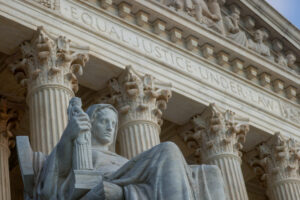
CNS photo by Leah Millis, Reuters
BY CAROL ZIMMERMANN
Catholic News Service
WASHINGTON (CNS) – When the Supreme Court heard oral arguments Dec. 1 for the biggest abortion case in decades, all eyes – and ears – were on the court.
The case before the nation's high court, Dobbs v. Jackson Women's Health Organization, is an appeal from Mississippi to keep its ban on abortions after 15 weeks of pregnancy. This ban was struck down by a federal District Court in Mississippi in 2018 and upheld a year later by the New Orleans-based U.S. Court of Appeals for the 5th Circuit.
The Mississippi law is being challenged by the state's only abortion facility, the Jackson Women's Health Organization.
When the court announced this spring that it would take this case, after considering it more than a dozen times since 2020, the justices said they would only review one of the three questions presented to them: "Whether all previability prohibitions on elective abortions are unconstitutional."
That point of viability – when a fetus is said to be able to survive on its own – is key because the Supreme Court has consistently ruled that states cannot restrict abortion before 24 weeks, or when a fetus could survive on its own. Mississippi's ban on abortions after 15 weeks is more restrictive than current law.
If the court sides with Mississippi, it would be the first time the court would allow an abortion ban before the point of viability and could lay the groundwork for other abortion restrictions that other states could follow.
When the court agreed to take this case, Kat Talalas, assistant director for pro-life communications at the U.S Conference of Catholic Bishops, said the justices could potentially establish criteria other than viability, such as fetal pain, for restricting abortions.
A friend-of-the-court brief submitted by Mississippi's Catholic dioceses of Jackson and Biloxi focused on fetal pain and said the court should "find that the state's interest in protecting unborn children who have the capacity to feel pain is sufficiently compelling to support a limited prohibition on abortion."
The brief also urged that a "sense of morality, and indeed, logic, must prevail in the courts on this issue. How is it that Mississippi law recognizes that an unborn baby can be a victim of a crime, and can have property rights, and yet the label of personhood at 15-weeks gestation is denied them?"
The USCCB, in its brief, stressed that abortion is not a right created by the Constitution and called it "inherently different from other types of personal decisions to which this court has accorded constitutional protection."
Referring to the court's major abortion decisions, the brief warned that if the Supreme Court "continues to treat abortion as a constitutional issue," it will face more questions in the future about "what sorts of abortion regulations are permissible."
The court's two big decisions on abortion were Roe v. Wade, the 1973 court case that legalized abortion, and Casey v. Planned Parenthood in 1992, which affirmed Roe and also stressed that a state regulation on abortion could not impose an "undue burden" on a woman "seeking an abortion before the fetus attains viability."
